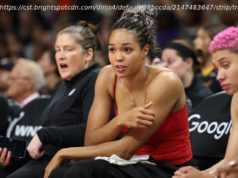There will still be inevitable griping about rulings on the field, but there will also be fewer blunders that unfairly decide games so important to so many people.
KAZAN, Russia — If soccer officials thought that introducing the use of video to help referees in this World Cup would stop the disputes, they were mistaken.
Take a few of the headlines from Sunday, the day after France defeated Australia, 2-1, with help from a penalty kick awarded after video review:
“‘I Got the Ball’: Risdon slams costly VAR penalty,” shouted the Sydney Morning Herald . “Mat Ryan feels Australia were hard done by,” said The Guardian .
Clearly, even after the small fortune invested in technology and training, the video-assistant-referee system, known as V. A. R., is no panacea.
On the club level, the Premier League, the world’s most prestigious domestic soccer competition, and UEFA, which runs the Champions League, the most prestigious international club competition, are still not ready to commit to V. A. R.
But that does not mean FIFA, the sport’s often untrustworthy governing body, is on the wrong path. There will be bumps, maybe even an occasional accident, but the use of replay in critical situations, which is what V. A. R. is to be limited to, is still the best chance to make the World Cup and the sport a fairer proposition.
There have been too many blunders, too much lost trust, through the decades to think otherwise. Diego Maradona’s “Hand of God” goal against England in the 1986 World Cup might have quite a ring to it, but it was also a travesty and a blown call.
Even Maradona now agrees that trying to avoid a repeat is the right move, and it is all the more necessary in a media landscape where every fan with access to a screen is able to watch replay after replay of pivotal moments and decisions. The referees, until now, have been stuck with real time and the blur of the moment and having to judge the actions of players who have been training their whole lives, in some cases, to be world-class thespians.
“We’re just starting out, but we are convinced that eventually video will be beneficial to soccer because behavior will change,” Pascal Garibian, France’s national technical director for referees, said in an interview this month with France Football.
There is already some evidence. Major League Soccer in the United States and Germany’s Bundesliga have been among the early adopters, and each week they work out a few more kinks. Italy’s Serie A used V. A. R. last season for the first time. According to the league, which compared data with the previous season, referee errors dropped from 5.78 percent of decisions to less than 1 percent. Expulsions were down 7.1 percent. And on a particularly encouraging note, simulation, also known as diving, was down 35.3 percent.
Meanwhile, the amount of time when the ball was actually in play during a 90-minute game increased by an average of 43 seconds to just over 51 minutes. Fewer arguments over decisions mean fewer long discussions.
Such number-crunching naturally will be done during this World Cup, as well, and with good reason. Concern about maintaining soccer’s flow has long been one of the big arguments against the use of any system with the power to pause play. Many other sports that have successfully introduced electronic review or video review already had frequent breaks in play: cricket, baseball, tennis, the American version of football, basketball and other competitions. Soccer, the critics say, thrives on its continuous action.
But the truth is, soccer has no shortage of breaks already: substitutions, corner kicks, free kicks, throw-ins, injuries and even the delays caused by players’ surrounding a referee after a whistle (or no whistle) and expressing their discontent, often at length.
The introduction of V. A. R. in Italy has reduced such protests, and also significantly reduced the number of red cards given for arguing. Nor has there been a red card given for any reason in the first nine matches of this World Cup through Sunday morning.
It is, after all, harder to bicker with video than a human. But that does not mean it is impossible, and the key for FIFA and everyone else going forward is to ensure that the spirit of the new rule allowing V. A. R. is respected.
It should only be used when officials have made “a clear and obvious” error.
That was at the heart of the Australian argument on Saturday in Kazan, when France striker Antoine Griezmann went down after contact with Australia defender Joshua Risdon, who clipped Griezmann’s left heel with his own foot after a sliding tackle as Griezmann crossed into Australia’s penalty area.
The Uruguayan referee of the match, Andrés Cunha, did not call a foul, but at the next stoppage in play, after being alerted to a possible error through an earpiece linked to a video assistant monitoring the match in Moscow, Cunha went to the sideline and watched relevant replays of the tackle. Under the V. A. R. system, it should be noted, he still has the final say.
In this instance, after returning to the field, Cunha awarded a penalty kick to France, as well as a yellow card to Risdon. Griezmann scored to give France its first goal.
Risdon later insisted that he had touched the ball with his extended right foot before the contact with Griezmann.
“My understanding is that obviously if it’s a clear-cut wrong decision then it can get overturned, but I felt like I definitely got the ball so therefore I don’t think it was a clear-cut wrong decision,” Risdon said, arguing there seemed to be “a bit of a gray area”.
The Australian television network Optus Sport later reported that, after looking at footage from a camera angle not used by V. A. R., Risdon’s contact with the ball was beyond dispute, and that he had deflected the ball off Griezmann, knocking it too far ahead of the Frenchman for him to reach it before Australia’s goalkeeper, Matthew Ryan, would have reached it.
Bert van Marwijk, Australia’s coach, said he sensed hesitation in Cunha as Cunha reviewed the footage on the sideline.
“I saw him standing there, and he was doubting,” van Marwijk said. “I know he’s human, so he’s standing there, and he’s thinking, ‘I don’t know.’ He saw that it was no penalty, and now it’s, ‘I don’t know.’ So he has to choose France or Australia.”
Cunha, per FIFA policy, was not available to confirm or deny van Marwijk’s interpretation.






